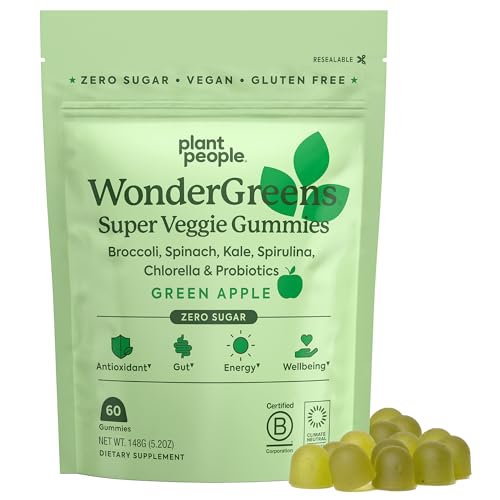
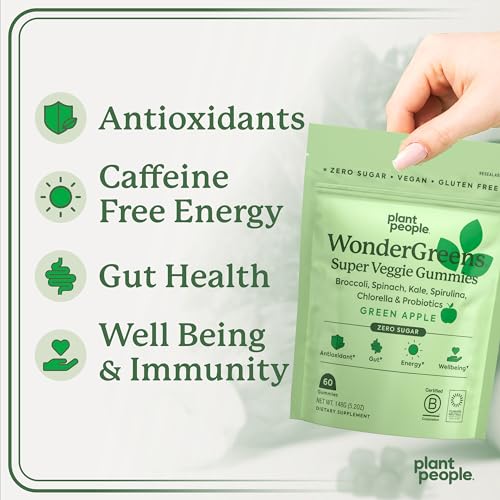
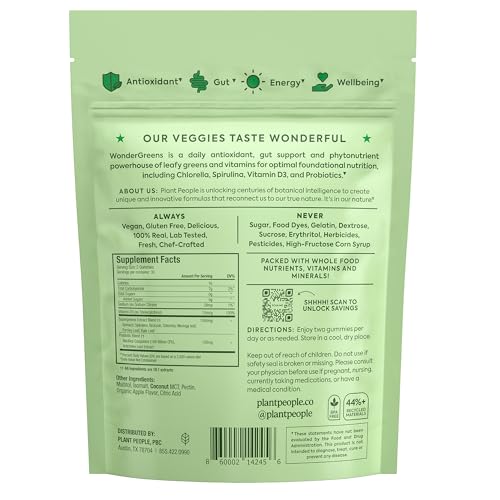
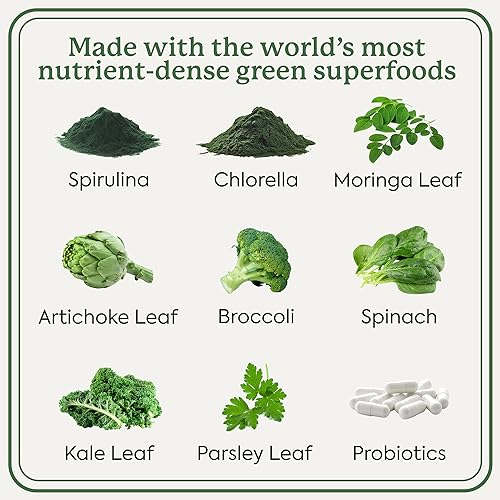
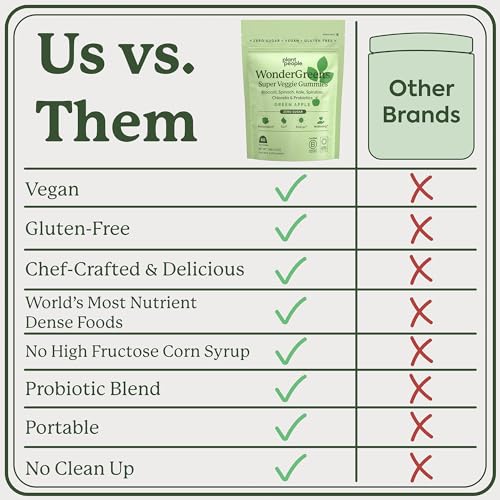

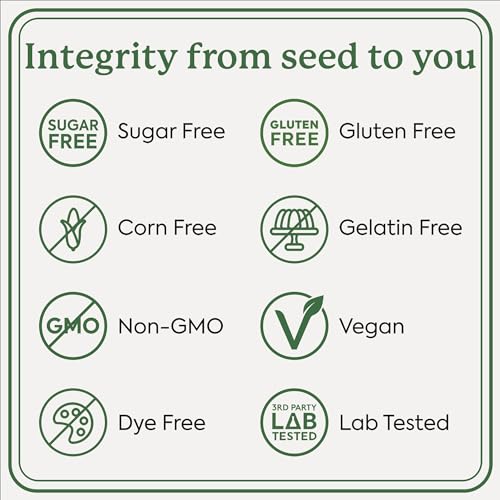
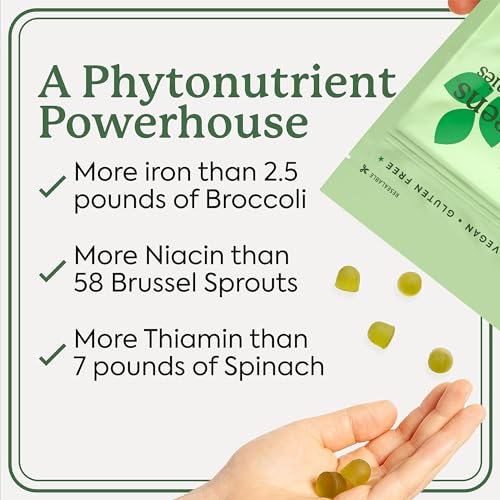
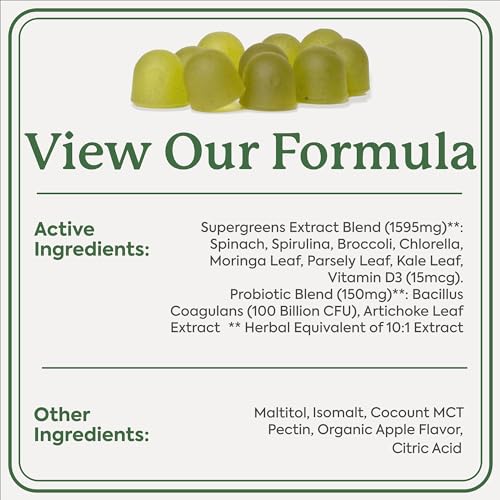
Plant People WonderGreens Gummies - Boosts Immunity & Gut Health, Vegan, Green Apple - 60 Count


Vitamin D3
High RiskVitamin D3, also known as cholecalciferol, is a fat-soluble vitamin important for calcium metabolism and bone health. It is synthesized in the skin upon exposure to sunlight and is also found in some foods and supplements. Its primary function is to promote the absorption of calcium and phosphorus in the body.
Sustai Insights
Vitamin D3 offers functional benefits such as supporting bone health and immune function. However, excessive intake can lead to toxicity, presenting risks like hypercalcemia. Environmental concerns include its potential for bioaccumulation. Regulatory bodies impose usage restrictions due to these risks, resulting in a high overall risk assessment. Safe usage practices should be observed, and alternatives such as vitamin D2 may be considered.
Citric Acid
Medium RiskCitric acid is an alpha hydroxy acid used in personal care products primarily for its role as a pH adjuster and natural preservative. It occurs naturally in citrus fruits and is commonly utilized in various formulations for its chelating properties and mild exfoliation benefits.
Sustai Insights
Citric acid offers functional benefits as an effective preservative and pH stabilizer, contributing to product longevity and stability. It is biodegradable and derived from renewable sources. Health risks are low, with minimal concerns regarding carcinogenicity, allergies, and reproductive toxicity. However, moderate use restrictions exist due to potential irritation at high concentrations. Environmental risks are limited, as citric acid is not known to accumulate in ecosystems. Regulatory agencies have no significant advisories against its use. Overall, it is assessed as a medium-risk ingredient, with safe usage practices recommended and alternatives available.
Cocos Nucifera (Coconut)
Medium RiskCocos Nucifera, commonly known as coconut, is derived from the coconut palm. It is widely used in various cosmetic and personal care products for its moisturizing properties, acting as an emollient and skin-conditioning agent, enhancing texture and hydration.
Sustai Insights
Cocos Nucifera offers functional benefits such as effective moisturization and conditioning for the skin, while being biodegradable and often sustainably sourced. Health risks are minimal, with low concerns for carcinogenicity, allergies, and reproductive toxicity. Environmental risks are also low, as it does not accumulate in organisms or significantly pollute. Regulatory bodies do not impose restrictions, supporting its overall low-risk status. Safe usage practices include patch testing for sensitivities, though alternatives like shea butter or jojoba oil may offer similar benefits.
Vitamin K2
Low RiskVitamin K2 is a fat-soluble vitamin that plays a critical role in blood coagulation and bone metabolism. It is primarily found in fermented foods and animal products and functions as a cofactor for proteins involved in calcium regulation.
Sustai Insights
Vitamin K2 is recognized for its essential role in bone health and cardiovascular function, contributing to effective calcium utilization in the body. It is generally considered safe, with low concerns for cancer, allergies, and reproductive toxicity. Environmentally, it poses minimal risks, showing no significant pollutant potential. Currently, it is not restricted by regulatory bodies, and overall risk assessment indicates low concern. For safe usage, it is advisable to consult healthcare professionals, especially for individuals on anticoagulant therapy. Alternatives include Vitamin K1 and dietary sources rich in this vitamin.
Maltitol
Low RiskMaltitol is a disaccharide polyol derived from the hydrogenation of maltose. It is commonly used as a sugar substitute in various food and cosmetic products due to its sweetness and lower caloric content compared to traditional sugars. Maltitol functions primarily as a humectant and sweetener.
Sustai Insights
Maltitol provides functional benefits as a sweetening agent with lower glycemic impact and is often used in sugar-free products. It is considered to have low health risks, including a low potential for carcinogenicity, allergy, and reproductive toxicity. Environmentally, it poses minimal risk as it is not bioaccumulative. Regulatory status is favorable, with no significant restrictions noted. Overall, maltitol is assessed as low risk, making it a suitable ingredient in appropriate concentrations.
Caprylic Triglyceride
Low RiskCaprylic triglyceride is an ester derived from coconut oil and glycerin, commonly used in cosmetic formulations as an emollient, stabilizer, and skin-conditioning agent. It helps to improve the texture and spreadability of products while providing a lightweight, non-greasy feel.
Sustai Insights
Caprylic triglyceride offers functional benefits such as enhanced skin moisturization and improved formulation stability. It is generally regarded as safe, with low concerns regarding carcinogenicity, allergenic potential, and reproductive toxicity. Environmental impact is minimal, with no significant pollutant or bioaccumulative properties identified. Regulatory bodies have not issued warnings or restrictions. Overall, the risk level is low, making it a suitable ingredient in cosmetic products. Safe usage practices include adhering to recommended concentrations, and while there are alternatives, caprylic triglyceride remains a reliable choice.
Spinacia Oleracea (Spinach)
Low RiskSpinacia oleracea (spinach) is a leafy green vegetable known for its nutrient density and is commonly used in various food products for its flavor and health benefits. It contains vitamins, minerals, and antioxidants, making it a popular ingredient in salads, smoothies, and dietary supplements.
Sustai Insights
Spinach offers functional benefits such as nutrient enrichment and antioxidant properties, contributing positively to health. It is sustainably sourced and biodegradable. Health risks are minimal, with low concerns regarding carcinogenicity, allergies, or reproductive toxicity. Environmental hazards are low, and it poses no regulatory warnings. Overall, it is assessed as a low-risk ingredient suitable for various uses.
Apple Pectin
Low RiskApple pectin is a natural polysaccharide found in the cell walls of apples. It is commonly used as a gelling agent, thickener, and stabilizer in food products, as well as in cosmetics and pharmaceuticals. Its gelling properties are utilized to improve texture and consistency.
Sustai Insights
Apple pectin serves as an effective thickener and stabilizer, contributing to the texture of various products. It is biodegradable and derived from renewable sources, enhancing its sustainability profile. Health risks are minimal, with low concerns for carcinogenicity, allergies, or reproductive toxicity. Environmental impact is also low, with no known pollutants or bioaccumulation issues. Regulatory status is clear, with no current restrictions. Overall, the risk level associated with apple pectin is low, making it a safe ingredient for use in formulations.
Spirulina
Low RiskSpirulina is a blue-green microalga known for its high nutritional profile, including proteins, vitamins, and antioxidants. It is commonly used as a dietary supplement and ingredient in health foods, offering various functional benefits such as promoting energy and supporting immune health.
Sustai Insights
Spirulina is recognized for its functional benefits, including high protein content and antioxidant properties, making it a valuable dietary supplement. It is sustainably sourced and biodegradable. Health risks are minimal, with low concerns regarding carcinogenicity, allergies, or reproductive toxicity, and it is not subject to significant regulatory restrictions. Overall, the risk level is assessed as low, indicating a favorable profile for use in food and supplements.
Isomalt
Low RiskIsomalt is a mixture of polysaccharides produced from sucrose, primarily used as a sugar substitute in various food and cosmetic products due to its functional properties such as sweetness and stability. It is often valued for its lower caloric content compared to traditional sugars.
Sustai Insights
Isomalt serves effectively as a sweetener and bulking agent, contributing to product texture and flavor without the high caloric content of sugar. It is considered low-risk concerning health effects, with minimal concerns regarding carcinogenicity, allergies, or reproductive toxicity. Environmentally, isomalt is not classified as a significant pollutant and poses low bioaccumulation risk. While regulatory bodies do not impose strict limitations, it is noted that certain formulations should avoid excess isomalt. Overall, isomalt presents a low-risk profile, making it a suitable choice in formulations.
Vitamin K2
Low RiskVitamin K2 is a fat-soluble vitamin that plays a critical role in blood coagulation and bone metabolism. It is primarily found in fermented foods and animal products and functions as a cofactor for proteins involved in calcium regulation.
Sustai Insights
Vitamin K2 is recognized for its essential role in bone health and cardiovascular function, contributing to effective calcium utilization in the body. It is generally considered safe, with low concerns for cancer, allergies, and reproductive toxicity. Environmentally, it poses minimal risks, showing no significant pollutant potential. Currently, it is not restricted by regulatory bodies, and overall risk assessment indicates low concern. For safe usage, it is advisable to consult healthcare professionals, especially for individuals on anticoagulant therapy. Alternatives include Vitamin K1 and dietary sources rich in this vitamin.
Maltitol
Low RiskMaltitol is a disaccharide polyol derived from the hydrogenation of maltose. It is commonly used as a sugar substitute in various food and cosmetic products due to its sweetness and lower caloric content compared to traditional sugars. Maltitol functions primarily as a humectant and sweetener.
Sustai Insights
Maltitol provides functional benefits as a sweetening agent with lower glycemic impact and is often used in sugar-free products. It is considered to have low health risks, including a low potential for carcinogenicity, allergy, and reproductive toxicity. Environmentally, it poses minimal risk as it is not bioaccumulative. Regulatory status is favorable, with no significant restrictions noted. Overall, maltitol is assessed as low risk, making it a suitable ingredient in appropriate concentrations.
Caprylic Triglyceride
Low RiskCaprylic triglyceride is an ester derived from coconut oil and glycerin, commonly used in cosmetic formulations as an emollient, stabilizer, and skin-conditioning agent. It helps to improve the texture and spreadability of products while providing a lightweight, non-greasy feel.
Sustai Insights
Caprylic triglyceride offers functional benefits such as enhanced skin moisturization and improved formulation stability. It is generally regarded as safe, with low concerns regarding carcinogenicity, allergenic potential, and reproductive toxicity. Environmental impact is minimal, with no significant pollutant or bioaccumulative properties identified. Regulatory bodies have not issued warnings or restrictions. Overall, the risk level is low, making it a suitable ingredient in cosmetic products. Safe usage practices include adhering to recommended concentrations, and while there are alternatives, caprylic triglyceride remains a reliable choice.
Citric Acid
Medium RiskCitric acid is an alpha hydroxy acid used in personal care products primarily for its role as a pH adjuster and natural preservative. It occurs naturally in citrus fruits and is commonly utilized in various formulations for its chelating properties and mild exfoliation benefits.
Sustai Insights
Citric acid offers functional benefits as an effective preservative and pH stabilizer, contributing to product longevity and stability. It is biodegradable and derived from renewable sources. Health risks are low, with minimal concerns regarding carcinogenicity, allergies, and reproductive toxicity. However, moderate use restrictions exist due to potential irritation at high concentrations. Environmental risks are limited, as citric acid is not known to accumulate in ecosystems. Regulatory agencies have no significant advisories against its use. Overall, it is assessed as a medium-risk ingredient, with safe usage practices recommended and alternatives available.
Spinacia Oleracea (Spinach)
Low RiskSpinacia oleracea (spinach) is a leafy green vegetable known for its nutrient density and is commonly used in various food products for its flavor and health benefits. It contains vitamins, minerals, and antioxidants, making it a popular ingredient in salads, smoothies, and dietary supplements.
Sustai Insights
Spinach offers functional benefits such as nutrient enrichment and antioxidant properties, contributing positively to health. It is sustainably sourced and biodegradable. Health risks are minimal, with low concerns regarding carcinogenicity, allergies, or reproductive toxicity. Environmental hazards are low, and it poses no regulatory warnings. Overall, it is assessed as a low-risk ingredient suitable for various uses.
Vitamin D3
High RiskVitamin D3, also known as cholecalciferol, is a fat-soluble vitamin important for calcium metabolism and bone health. It is synthesized in the skin upon exposure to sunlight and is also found in some foods and supplements. Its primary function is to promote the absorption of calcium and phosphorus in the body.
Sustai Insights
Vitamin D3 offers functional benefits such as supporting bone health and immune function. However, excessive intake can lead to toxicity, presenting risks like hypercalcemia. Environmental concerns include its potential for bioaccumulation. Regulatory bodies impose usage restrictions due to these risks, resulting in a high overall risk assessment. Safe usage practices should be observed, and alternatives such as vitamin D2 may be considered.
Apple Pectin
Low RiskApple pectin is a natural polysaccharide found in the cell walls of apples. It is commonly used as a gelling agent, thickener, and stabilizer in food products, as well as in cosmetics and pharmaceuticals. Its gelling properties are utilized to improve texture and consistency.
Sustai Insights
Apple pectin serves as an effective thickener and stabilizer, contributing to the texture of various products. It is biodegradable and derived from renewable sources, enhancing its sustainability profile. Health risks are minimal, with low concerns for carcinogenicity, allergies, or reproductive toxicity. Environmental impact is also low, with no known pollutants or bioaccumulation issues. Regulatory status is clear, with no current restrictions. Overall, the risk level associated with apple pectin is low, making it a safe ingredient for use in formulations.
Spirulina
Low RiskSpirulina is a blue-green microalga known for its high nutritional profile, including proteins, vitamins, and antioxidants. It is commonly used as a dietary supplement and ingredient in health foods, offering various functional benefits such as promoting energy and supporting immune health.
Sustai Insights
Spirulina is recognized for its functional benefits, including high protein content and antioxidant properties, making it a valuable dietary supplement. It is sustainably sourced and biodegradable. Health risks are minimal, with low concerns regarding carcinogenicity, allergies, or reproductive toxicity, and it is not subject to significant regulatory restrictions. Overall, the risk level is assessed as low, indicating a favorable profile for use in food and supplements.
Cocos Nucifera (Coconut)
Medium RiskCocos Nucifera, commonly known as coconut, is derived from the coconut palm. It is widely used in various cosmetic and personal care products for its moisturizing properties, acting as an emollient and skin-conditioning agent, enhancing texture and hydration.
Sustai Insights
Cocos Nucifera offers functional benefits such as effective moisturization and conditioning for the skin, while being biodegradable and often sustainably sourced. Health risks are minimal, with low concerns for carcinogenicity, allergies, and reproductive toxicity. Environmental risks are also low, as it does not accumulate in organisms or significantly pollute. Regulatory bodies do not impose restrictions, supporting its overall low-risk status. Safe usage practices include patch testing for sensitivities, though alternatives like shea butter or jojoba oil may offer similar benefits.
Isomalt
Low RiskIsomalt is a mixture of polysaccharides produced from sucrose, primarily used as a sugar substitute in various food and cosmetic products due to its functional properties such as sweetness and stability. It is often valued for its lower caloric content compared to traditional sugars.
Sustai Insights
Isomalt serves effectively as a sweetener and bulking agent, contributing to product texture and flavor without the high caloric content of sugar. It is considered low-risk concerning health effects, with minimal concerns regarding carcinogenicity, allergies, or reproductive toxicity. Environmentally, isomalt is not classified as a significant pollutant and poses low bioaccumulation risk. While regulatory bodies do not impose strict limitations, it is noted that certain formulations should avoid excess isomalt. Overall, isomalt presents a low-risk profile, making it a suitable choice in formulations.
Discover the power of nature with Plant People WonderGreens Veggie Gummies! These delicious green apple-flavored superfood gummies combine nutrient-dense ingredients to support your health and wellbeing. Each gummy is packed with essential vitamins and probiotics to nourish your body while being environmentally conscious.
- Nutrient-Dense Support: A blend of spirulina, chlorella, and moringa provides foundational nutrition, delivering more iron than 16 cups of broccoli per serving.
- Gut Health Boost: With 100 billion probiotics, these gummies enhance digestion and promote a healthy gut environment.
- Antioxidant-Rich Formula: Fortified with vitamins D3 and K2, they help combat oxidative stress and support overall wellness.
- Deliciously Healthy: Enjoy the refreshing green apple flavor made with natural, vegan, non-GMO ingredients, free from gluten and artificial additives.
- Eco-Friendly Packaging: Thoughtfully packaged in recyclable pouches, significantly reducing carbon emissions compared to competitors, making a positive impact on both health and the planet.
Subscribe & Save with Sustai
- Best Price Guarantee: Always enjoy the lowest prices on sustainable home essentials.
- No Surprises: We’ll notify you before shipping. No hidden fees, ever.
- You’re in Charge: Change, pause, or cancel your subscription anytime with ease.
- Eco-Friendly Deliveries: Our grouped shipments mean less packaging and lower emissions.
Join us on a sustainable journey. Special offers for a limited time! Prices and promotions may change.
Recommended Products
Discover the power of nature with Plant People WonderGreens Veggie Gummies! These delicious green apple-flavored superfood gummies combine nutrient-dense ingredients to support your health and wellbeing. Each gummy is packed with essential vitamins and probiotics to nourish your body while being environmentally conscious.
- Nutrient-Dense Support: A blend of spirulina, chlorella, and moringa provides foundational nutrition, delivering more iron than 16 cups of broccoli per serving.
- Gut Health Boost: With 100 billion probiotics, these gummies enhance digestion and promote a healthy gut environment.
- Antioxidant-Rich Formula: Fortified with vitamins D3 and K2, they help combat oxidative stress and support overall wellness.
- Deliciously Healthy: Enjoy the refreshing green apple flavor made with natural, vegan, non-GMO ingredients, free from gluten and artificial additives.
- Eco-Friendly Packaging: Thoughtfully packaged in recyclable pouches, significantly reducing carbon emissions compared to competitors, making a positive impact on both health and the planet.

You can have at most 2 Sustainable Steals products in your cart
Customer Reviews
Customers’ View
Customers appreciate the taste and health benefits of the Super Greens Gummies, noting that they strike a balance between being sweet and tart without excessive sugar. Many users report improvements in gut health and increased energy levels, finding the gummies a delicious and convenient addition to their wellness routine. The product's vegan and clean formulation, free from artificial additives, aligns well with health-conscious values. Additionally, customers value the eco-friendly packaging as a significant bonus. Overall, users find these gummies effective in supporting their health while enjoying a pleasant flavor experience.
AI-generated from the text of customer reviewsThis product is rated 4.9 of 5.0 stars.
It has received 14 reviews.




